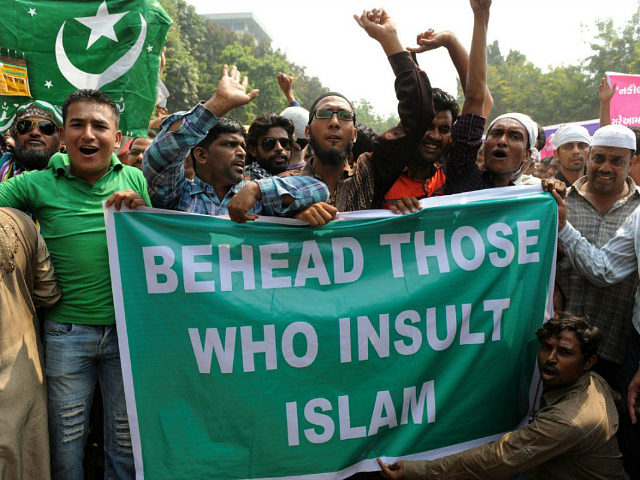Authorities in Pakistan’s Sindh province have officially charged four Muslims, including two women, with committing blasphemy against Islam during a wedding, an act that carries a potential penalty of life imprisonment or death.
The Express Tribune reports that the defendants, which include the groom, bride, her father, and a female marriage officiate, are accused of “mocking” Islam and “sentiments” of Muslims during Nazeer Ahmed Khoso and Sindhia Khoso’s wedding nearly ten days ago.
However, provincial leaders affiliated with the Sunni Deobandi political party Jamiat-e-Ulema-Islam – Fazl (JUI-F) have reportedly come out against the charges, marking a stark difference in actions taken by many Pakistani politicians during blasphemy cases involving religious minorities.
The Express Tribune reports:
Although the [blasphemy] act drew condemnation from a cross-section of society on social media, Jamiat-e-Ulema-Islam — Fazl (JUI-F) provincial leadership announced that they will fight a legal battle over the matter. JUI-F’s followers also campaigned on the social media against what they described as an “intentional derision of Islam.”
Even the Sindh Human Rights Defenders group has reportedly spoken against the charges, claiming the defendants “did not violate or blaspheme Islam.”
An act of blasphemy includes anything considered as an explicit insult to Allah, Islam, or religious leaders.
“The Constitution of Pakistan allows all religions and faiths freedom to practice,” reportedly argued one of the group’s advocates, Ali Palh, on behalf of the Muslim defendants whom authorities have linked to the Sufi sect of Islam, denounced as an idolatrous misinterpretation of the religion by fundamentalist Muslims.
It is unclear which branch of Islam the accused belong to, but Pakistan’s Sindh province is home to the Lal Shahbaz Qalandar shrine, the most revered Sufi holy site in the country that attracts up to a million visitors each year.
According to the Tribune, the blasphemy act was allegedly committed when the marriage officiate cited canonical law linked to Sufi Islam.
“The complainant, Assistant Sub-Inspector Bashir Ahmed Janwri, claimed the act ridiculed and profaned Shariati-e-Muhammadi (Islamic canonical law),” adds the newspaper. “According to him, the police came to know about the incident through social media after a video of [the marriage officiate] solemnizing the nikkah [Muslim marriage] spread like wildfire, drawing both condemnation and support.”
Nayab Sarkash, the marriage officiant, reportedly claims she mistakenly cited the Sufi-affiliated canonical law and apologized to the residents of Sindh whose sentiments may have been hurt by her act.
“After the clarification, [JUI-F provincial general secretary Rashid Mehmood] Soomro on September 26 gave up the call for pursuing the incident in court,” notes the Tribune. “He also requested his supporters via a social media message to refrain from arguing about the issue.”
Despite the objections to the charges, the Khanote police in Sindh’s Jamshoro district “lodged the case pointing out local pressure of the residents,” reveals the newspaper.
Law enforcement has only “booked” four people, including the two women, on blasphemy charges, but the Tribune acknowledges that an additional eight to ten “unknown persons” are also suspected of violating the statue.
“Nayab Sarkash, Abbass Ali Khoso alias Sojhro Sindhi, his daughter Sindhia and son-in-law Nazeer Ahmed Khoso, besides eight to 10 unknown persons, have been nominated under Section 295-A [blasphemy laws] of Pakistan Penal Code,” explains the Tribune. “The Jamshoro police arrested Khoso on Wednesday night and produced him before the judicial magistrate on Thursday who remanded the suspect to jail custody.”
Police officers are reportedly trying to arrest the other suspects “nominated” for punishment.
Pakistan’s strict blasphemy laws have primarily been used to target religious minority groups, particularly Christians who, like the Muslims in Sindh, often claim their innocence.
Blasphemy cases involving religious minorities are not known to be a cause of concern for Pakistani political parties and human rights groups.
On the contrary, some political parties have expressed support for using blasphemy laws to punish Christians in Pakistan.
A pro-blasphemy law Muslim extremist executed in Pakistan for killing a governor after he urged the country to reform its controversial statue in support of a Christian woman motivated the head a new Islamist party to adopt the rallying cry of “death to blasphemers.”
This month, Voice of America (VOA) learned from Mehdi Hassan, a prominent Pakistani human-rights activist, that blasphemy court cases seldom result in a fair trial, often leading to a harsh verdict of life in prison or death.

COMMENTS
Please let us know if you're having issues with commenting.